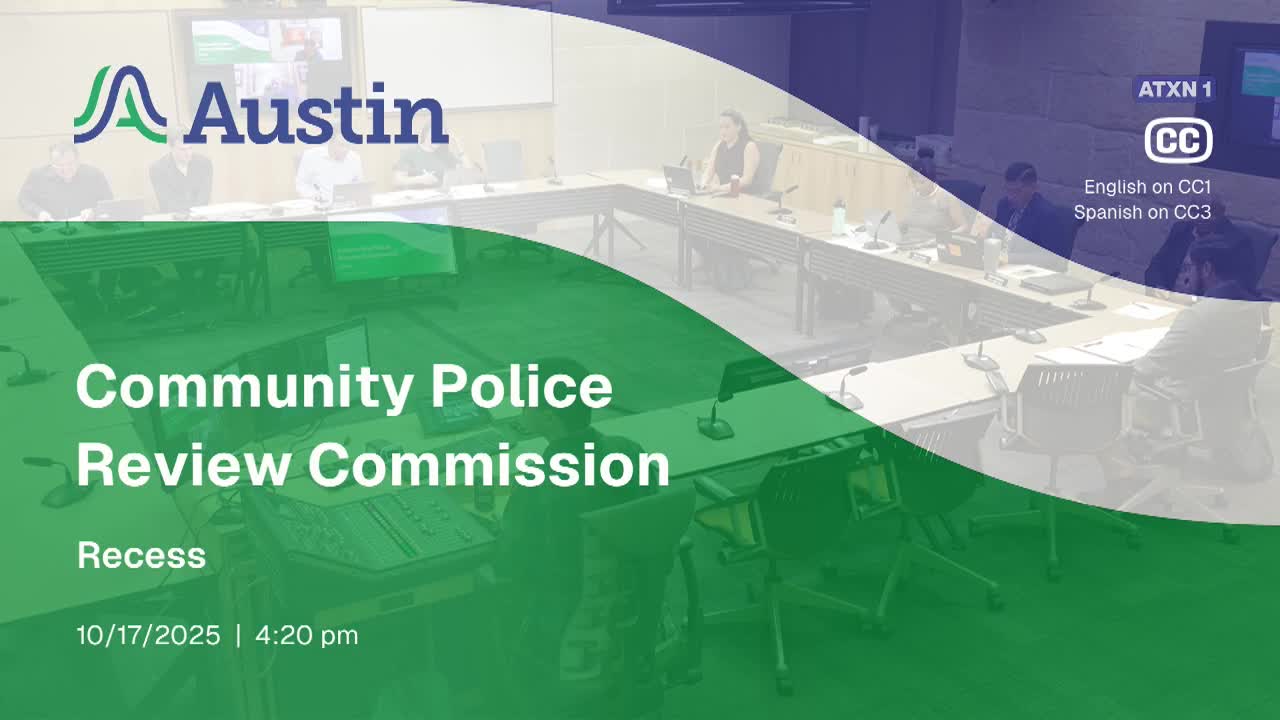CPRC chair presents draft internal operating procedures; staff flags scope limits and commissioners debate agenda control
October 17, 2025 | Austin, Travis County, Texas
This article was created by AI summarizing key points discussed. AI makes mistakes, so for full details and context, please refer to the video of the full meeting. Please report any errors so we can fix them. Report an error »

Chair Carlos Graves presented a draft internal operating procedures document on Oct. 17 intended to give the Community Police Review Commission a consistent template for agenda-setting, working‑group formation, recommendations and follow-up. Graves said he modeled the draft on the Public Safety Commission’s procedures and aimed to give members a clear “cheat sheet” and a way to track pending items so nothing falls through the cracks.
Key points in the draft included: a standard agenda-item request form for commissioners to submit requests; a requirement that the chair schedule time at the beginning and end of meetings to review pending items; guidance that city staff speakers be arranged when requested by at least two commissioners; an expectation that commissioners follow up on recommendations until they receive acknowledgment from the relevant city department; and an annual review requirement for the procedures.
City staff — including the commission’s executive liaison and the city clerk’s office representative — provided pushback on multiple items. Staff noted that several proposed duties (for example, a liaison-driven tracking log of commissioners’ follow-up requests) fall outside the liaison’s typical responsibilities under city code and training materials. Staff also said pending and future agenda items are routinely captured in the minutes rather than posted as separate official backup material.
Commissioners debated who should control the agenda. Several commissioners objected to language that would make agenda control solely the chair and vice chair’s responsibility, arguing that two or more commissioners should be able to place items on a proposed agenda and that the body should retain ways to override a chair if needed. Commissioners proposed adding a mechanism to avoid single points of failure, including an override by a defined majority and a sunset/annual review clause so the procedures can be amended in future.
Other amendments commissioners proposed or discussed: requiring brief charters and termination dates for working groups, adding a short statement of potential public impact on agenda requests, adding an attendance notice (reporting consecutive absences to the appointing authority), and an accessibility clause referencing the Americans with Disabilities Act and the City Language Access Policy.
Action: the commission voted unanimously to postpone consideration and approval of the internal operating procedures until the next meeting to allow commissioners to submit suggested language changes and align the draft with the clerk’s office guidance.
Why it matters: operating procedures and bylaws govern how the commission functions, who controls agenda-setting and how recommendations are tracked — all of which affect the commission’s ability to act transparently and responsively to public concerns.
Key points in the draft included: a standard agenda-item request form for commissioners to submit requests; a requirement that the chair schedule time at the beginning and end of meetings to review pending items; guidance that city staff speakers be arranged when requested by at least two commissioners; an expectation that commissioners follow up on recommendations until they receive acknowledgment from the relevant city department; and an annual review requirement for the procedures.
City staff — including the commission’s executive liaison and the city clerk’s office representative — provided pushback on multiple items. Staff noted that several proposed duties (for example, a liaison-driven tracking log of commissioners’ follow-up requests) fall outside the liaison’s typical responsibilities under city code and training materials. Staff also said pending and future agenda items are routinely captured in the minutes rather than posted as separate official backup material.
Commissioners debated who should control the agenda. Several commissioners objected to language that would make agenda control solely the chair and vice chair’s responsibility, arguing that two or more commissioners should be able to place items on a proposed agenda and that the body should retain ways to override a chair if needed. Commissioners proposed adding a mechanism to avoid single points of failure, including an override by a defined majority and a sunset/annual review clause so the procedures can be amended in future.
Other amendments commissioners proposed or discussed: requiring brief charters and termination dates for working groups, adding a short statement of potential public impact on agenda requests, adding an attendance notice (reporting consecutive absences to the appointing authority), and an accessibility clause referencing the Americans with Disabilities Act and the City Language Access Policy.
Action: the commission voted unanimously to postpone consideration and approval of the internal operating procedures until the next meeting to allow commissioners to submit suggested language changes and align the draft with the clerk’s office guidance.
Why it matters: operating procedures and bylaws govern how the commission functions, who controls agenda-setting and how recommendations are tracked — all of which affect the commission’s ability to act transparently and responsively to public concerns.
View full meeting
This article is based on a recent meeting—watch the full video and explore the complete transcript for deeper insights into the discussion.
View full meeting
